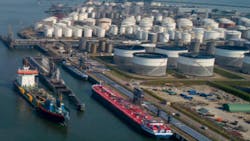Case study: HydraWell system completes first CCS project on Dutch Continental Shelf
Offshore staff
NORWAY — HydraWell recently detailed a case study for a project that took place in June with Port of Rotterdam for the CO2 Transport Hub and Offshore Storage (Porthos) on the Dutch Continental Shelf.
The Netherlands has clear climate objectives. The emission of greenhouse gases must be reduced by at least 55% in 2030 compared with 1990. By 2050, the Netherlands must be climate neutral.
The Dutch Climate Agreement underlines the importance of carbon capture and storage (CCS) for the energy transition. About 14% of CO2 emissions in the Netherlands takes place in the Rotterdam port area, making the region’s contribution to the national climate objectives important.
The client challenge was to deploy a proven method to create a cross sectional barrier (caprock) of the reservoir—the type of formation that has no permeability.
The £450 million (US$535 million) Porthos CCS project is a joint venture between the Port of Rotterdam Authority, Gasunie and Energie BeheerNederland (EBN). The project forms part of the Netherland’s fundamental goal to reduce emissions. With the support of various cross-sector organizations, the Porthos plan involves the transportation and storage of CO2 from the industry in the Port of Rotterdam.
HydraWell said its PWC (perforation, wash and cement) system entered new territory thanks to the successful completion of its first CCS project.
The technology provided a solution to complete a significant part of the key environmental undertaking, marking an important milestone for the future of CO2 storage in the Netherlands.
The project was performed on a jackup rig, with the benefit of having the wellhead on the seabed ensuring reduced costs and enhanced flexibility compared to a semisubmersible, not to mention less severe water depth.
The scope of work involved harnessing the PWC technology to place a rock-to-rock barrier above the reservoir to prevent hydrocarbon leakage into the sea. The solution was deployed in a single run.
By deploying PWC technology, HydraWell delivered less operational risk, increased efficiency and optimum results.
According to the company, "This nimble and flexible method is much in demand across a range of applications from permanent P&A and slot recovery to restoring annulus integrity and casing shoe repair."
Combined with a sustainable and cost-effective approach, HydraWell said its HydraHemera was an ideal fit for the Netherlands CCS project.
The campaign was delivered in less than 36 hours (conventional methods would have taken up to eight days).
HydraWell established predictability of the entire project and deployed a proven method to create an effective cross-sectional barrier.
11.16.2022
